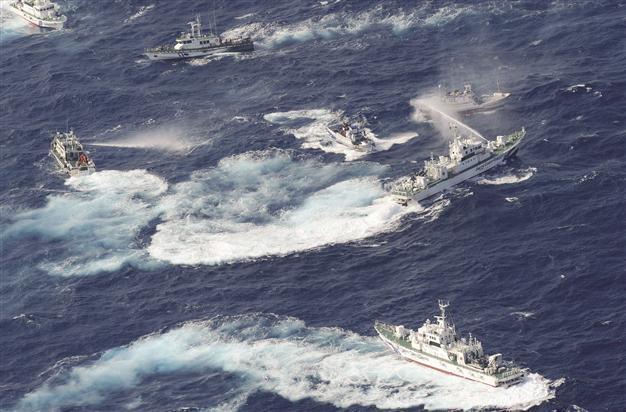Japan, Taiwan duel with water cannon on islands
TOKYO / BEIJING

A Japan Coast Guard vessel (R) sprays water against Taiwanese fishing boats,
while a Taiwanese coast guard ship (L) also sprays water in the East China Sea. AFP photo
Coastguard vessels from Japan and Taiwan clashed with water cannons yesterday after dozens of Taiwanese boats escorted by patrol ships sailed into waters around Tokyo-controlled islands, in the latest confrontation over a group of tiny islands in the East China Sea.
About 40 Taiwanese fishing boats and eight coast guard vessels entered waters near the islands in the morning, briefly triggering an exchange of water cannon fire with Japanese coast guard ships, who said the Taiwanese vessels ignored warnings to leave their territory. Japan’s coast guard said all vessels left their territorial waters a few hours later. Taiwan’s President Ma Ying-jeou voiced support for the flotilla’s “patriotic actions and acknowledges the coastguard for claiming our sovereignty while protecting the fishermen,” his office said in a statement, Agence France-Presse reported. Japanese Chief Cabinet Secretary Osamu Fujimura said Tokyo has complained to Taipei about the move, but that Tokyo was handling the situation as delicately as it could.
“Japan’s position is that, in light of good Japan-Taiwan relations, we must solve the issue peacefully. We wish to respond calmly,” he said.
Taiwan has friendly ties with Japan, but the two sides have long squabbled over fishing rights in the area. China and Taiwan both argue they have inherited China’s historic sovereignty over the islands. The Japanese government’s purchase of some of the uninhabited islands known as Senkaku in Japan and Diaoyu in China from private owners two weeks ago has sparked sometimes violent protests in China and informal boycotts of Japanese products.
First Chinese aircraft adds to tensionChina, Japan and Taiwan all claim the islands, but they are administered by Tokyo. While few experts expect a military confrontation, an unintended clash at sea would increase tension, although all sides are expected to try to manage the row before it spirals out of control. Adding to the tensions, China announced that its first aircraft carrier, the former Soviet navy’s unfinished “Varyag,” now christened “Liaoning,” has entered service, underscoring its ambitions to be a leading Asian naval power, although the ship is not expected to carry a full complement of planes or be ready for combat for some time.
The aircraft carrier, refitted from a ship bought from Ukraine, will have a limited role, mostly for training and testing ahead of the possible launch of China’s first domestically built carriers after 2015, analysts say.
China bought the aircraft carrier from Ukraine in 1998 and spent years refurbishing the ship. Turkey initially objected to the ship passing into the Aegean but high-level Chinese ministers visited Ankara to emphasize that the vessel’s passage through the Turkish Straits would draw thousands of Chinese tourists to Turkey. Turkey subsequently relented on its position and allowed the transit Nov. 1, 2001.
